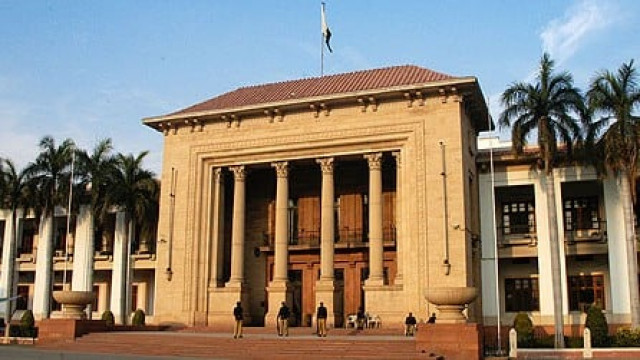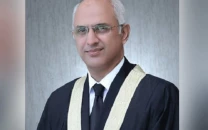Punjab Assembly: Nobody respects us, complain MPAs
Members demand exemption from security searches.

The opposition and treasury benches in the Punjab Assembly showed rare unity on Tuesday, with member after member bringing up a most-pressing concern the lack of protocol and privilege afforded to Members of the Provincial Assembly (MPAs). They were also unanimous on at least one part of the solution to the problem – exempt all MPAs from security searches of their vehicles or person.
Apart from a brief question and answer session on the Board of Revenue and Colonies Department, handled adeptly by Law Minister Rana Sanaullah, Tuesday’s sitting of some four hours was dominated by tales of MPAs being “humiliated” by security officials who had the temerity to search them or stop them taking their vehicles into restricted areas. The Punjab Assembly privileges committee was criticised as being ineffective.
Tuesday’s sitting started one hour late at 10.40am and adjourned at 3pm.
Malik Abbas Raan of the Pakistan Peoples Party (PPP) in his privilege motion complained that on August 25, he was stopped by a deputy superintendent of police (DSP) in Multan from parking his car near Fort Qasim when he went to attend the death anniversary of former governor Makhdoom Sajjad Hussain Qureshi. He said the DSP had been rude to him even though he introduced himself as an MPA. He said he had complained to the regional police officer (RPO) and city police officer (CPO) of Multan, but was ignored.
A couple of months ago, he said, he had visited Wagah where Rangers officials had stopped his vehicle. When he told them he was an MPA, they thought he was a Military Police official and asked him to park a kilometre away from the gate. In yet further “humiliations”, he was barred from taking his vehicle into the SSP (Operations) office in Lahore, while his car was also searched for weapons at a military checkpoint.
Raan said that he had been humiliated as an MPA so often over the last four years that he had become immune to embarrassment (“bist-proof”). He said MPAs were not respected by security personnel or civil servants.
Saeed Akbar Niwani of the Pakistan Muslim League-Nawaz complained about a recent incident in Sargodha where the police had entered the house of a former MPA and arrested him. He said that the privilege committee had not taken action over any privilege motion.
He said that a few months ago, a station house officer (SHO) summoned to answer a complaint moved to the committee had boasted that the members could not take any action against them and he had turned up only as a formality. He said under the previous government, civil servants and police had been scared of being called by the committee.
Sheikh Alauddin of the Unification Bloc said that he had decided never to approach the committee as its chairman was incompetent. He said that the committee’s role should be expanded and more members should be included in it.
Opposition Leader Raja Riaz (PPP) blamed the problem on Chief Minister Shahbaz Sharif. He said the chief minister showed no respect for MPAs and often humiliated them in front of civil servants, setting a bad example for bureaucrats and police.
Sanaullah Khan Mastikhel (PML-N) and Noor Haider Khan Niazi (MMA) also complained of being disrespected by civil servants.
Several members demanded that MPAs’ vehicles be exempt from searches at police checkpoints and be allowed to enter any public office without screening.
Sanaullah said that the speaker had promised to discuss all cases in the committee and to include more members in it. Malik Waris Kalo, chairman of the privileges committee, denied Niwani’s SHO story and said that the committee had entertained all motions.
Tuesday was private members day, when members can present resolutions of public interest.
Of four motions to be presented, one was withdrawn and two were not presented. Humaira Awais’s (PML-Quaid) resolution on a legal panchayat system in Punjab was passed.
Published in The Express Tribune, September 14th, 2011.



















COMMENTS
Comments are moderated and generally will be posted if they are on-topic and not abusive.
For more information, please see our Comments FAQ